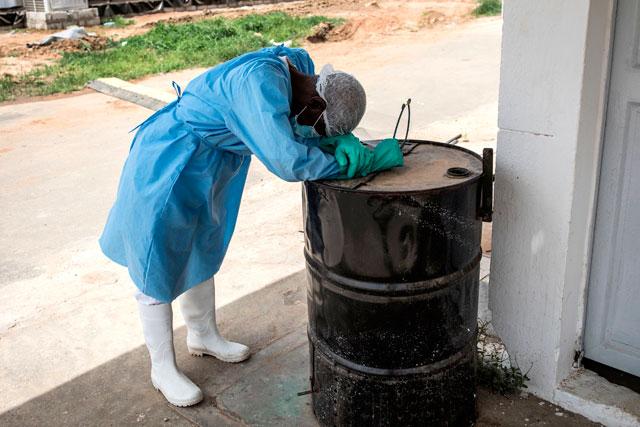- International News
- Mon-2020-06-29 | 03:45 pm

Global infections from the novel coronavirus have topped 10 million as the rate of new cases surges, particularly in the United States and Latin America, according to an AFP tally on Sunday.
One million new infections were recorded in only six days, according to the count based on official sources, just as countries start to unwind punishing lockdowns that have devastated their economies and thrown millions out of work.
The worldwide death toll from the disease that first emerged in China six months ago is also nearing 500,000 as fears grow of a full-blown second wave, with the rate of contagion doubling since May 21.
The United States, the hardest hit country, has surpassed 2.5 million cases alone, as efforts to reopen the world's economic powerhouse were set back by a jump in new infections in big states such as Florida.
President Donald Trump was under mounting pressure to set an example by wearing a facemask as his health secretary warned the "window is closing” for the country to gain control of the pandemic.
The disease is also rampaging through Latin America, where Brazil has over 1.3 million cases alone.
Infections are up too in other parts of the world that have reopened, with Europe still registering the biggest caseload at over 2.6 million, although daily rates have stabilised.
‘Severe and complicated’
Several countries are having to impose new restrictions as fresh outbreaks occur.
China imposed a strict lockdown on nearly half-a-million people in a province surrounding Beijing to contain a fresh cluster.
Beijing official Xu Hejian described the situation as "severe and complicated”, saying the city needed to continue tracing the spread of the virus.
And the British government warned it may have to shut down the central English city of Leicester and its population of 340,000 because of a spike in cases that media reports said were linked to outbreaks at food production plants.
The news comes at a worrying time for Europe’s worst affected country.
Prime Minister Boris Johnson’s government is set to ease lockdown restrictions from July 4 — despite predictions of a second wave — opening pubs, restaurants and hairdressers across England.
‘Very serious situation’
The tension between reopening battered economies — efforts pushed in the US by Trump — and public health is a source of debate in nearly every country.
US deaths now exceed 125,000, about one-quarter of the world total.
"This is a very, very serious situation and the window is closing for us to take action and get this under control,” Health and Human Services Secretary Alex Azar said on CNN.
The EU has pushed back a decision on a list of "safe countries” from which travellers can visit Europe — a list which could exclude the US.
In Florida, Republican Governor Ron DeSantis conceded there has been an "explosion” in new cases as the "Sunshine State” notched a record 9,585 cases in 24 hours.
The average age of people infected has dropped sharply — to 33 from 65 two months ago. Young people frustrated by months of confinement have poured back to the state’s beaches, boardwalks and bars, often without masks and seemingly unconcerned about social distancing.
Miami announced beaches will close over the July 4 holiday weekend and bars are also shutting their doors.
With Trump struggling to lift his reelection bid off the ground ahead of November, the campaign confirmed that events featuring Vice President Mike Pence in Arizona and Florida next week have been postponed "out of an abundance of caution”.
In California, the governor ordered some areas to reinstate stay-at-home orders, while San Francisco announced a "pause” in its reopening.
Texas — among the first US states to reopen — also shut down its bars after the governor conceded he had allowed them to get back to business too soon.
Infections are also running higher in India, where densely populated cities have been particularly hard hit, although a nationwide lockdown is gradually being eased.
The country set a daily record on Saturday with 18,500 new cases and 385 deaths. Total infections are at 509,000, with more than 15,600 deaths.
Iran, which has struggled to curb its outbreak even as it gradually lifted restrictions from April, said it will make mask-wearing mandatory in certain areas from next week.
The virus has also thrown world sports into turmoil, although South Korea said it will begin allowing limited numbers of spectators at sports events and the Brazilian state of Rio de Janeiro said it will allow some football fans into stadiums from July 10













